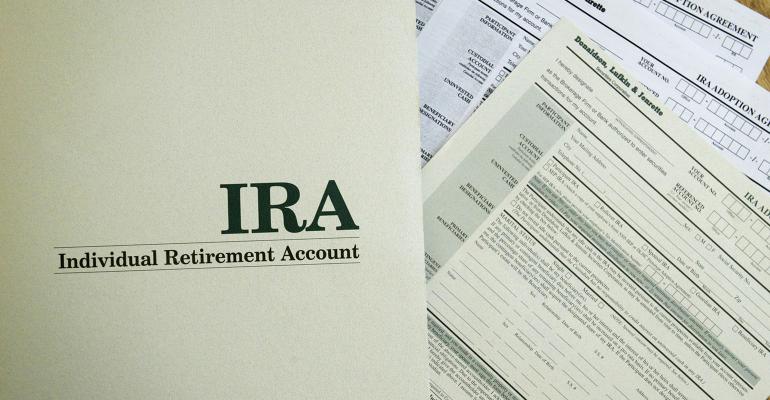IRA rollovers are a huge business for many wealth advisors, with close to or over $800 billion leaving DC plans annually over the last three years, according to Cerulli. While some RPAs focus on rollovers, most see them as lost revenue opportunities. But with the new DOL fiduciary rule, the potential for in-plan retirement income, and fintechs like Pontera and Future Capital, will IRA rollovers diminish or evolve?
Cerulli shows that 63.5% of rollovers went to advisors in 2023 up from 57% in 2021 with existing advisors capturing 84.6% last year, slightly down from two years before. Existing advisors captured about 85% of advisor assets with account balances above $200,000 while new advisor account balances were 28% lower. Self-directed IRAs accounted for 28.4% of assets in 2023 down from $34.5% in 2021 with account balances dropping to $110,300 from $120,800. Plan to plan was the lowest segment at about 8% over the past three years.
IRA rollovers are the most common form of convergence though some RPA aggregators like Captrust do not think it is a good business. The Cerulli numbers show that most assets go to advisors with existing advisory relationships.
So the existential question for RPAs is whether they can use their advantage to form relationships with participants, especially the wealthier ones, and be there or know when a rollover event is about to happen. Wealth advisors have an obvious advantage with existing clients, but the DOL fiduciary rule will require an assessment of whether it is in their client’s best interest to roll out of their plan. Those using Pontera or Future Capital may not see an advantage as they can manage the money and still get paid.
Firms like IRALogix are being used to make IRAs be more “institutional.”
If in-plan retirement income ever takes off, especially embedded within TDFs or managed accounts, it might inhibit rollovers if those investments are not readily available outside the plan.
As the momentum for the convergence of wealth and retirement continues, RPAs are trying to form relationships with participants early, especially HENRYs. Identifying attractive wealth clients is not easy or obvious—some with low accounts balances may have significant assets elsewhere. Certainly, highly compensated employees are obvious opportunities as well as savvy participants using HSAs, but much of the wealth in the U.S. is hidden, making access to data within and outside the workplace essential.
The key is marketing and awareness and while record keepers may seem to have an advantage because their brand is on the website and statements, according to recent research by the Defined Contribution Institutional Investment Association and a major consulting firm, most participants do not even know who their provider is, which is even more challenging for RPAs.
IRA rollovers may be the tip of the sword to work with participants as a growing number of RPAs are trying to either find wealthy participants to cross-sell financial planning and other wealth services or provide advice at scale to the masses, which is starting to attract wealth advisors to the DC market due in part to the explosion of smaller plans.
The workplace is an obvious and potentially easy way to access and help DC participants without an advisor, estimated at 97%, with some data available and greater trust and fiduciary oversight important for less sophisticated investors. And though harvesting IRA rollovers, most with modest balances, may not be a great business, it is just one of many services that advisors can offer participants in the plans they manage to form relationships leading to a more lucrative engagement.
Which, of course, may put advisors and record keepers at odds over who gets to work with these participants and how to best collaborate, which is the proverbial sticky wicket.
Fred Barstein is founder and CEO of TRAU, TPSU and 401kTV.




